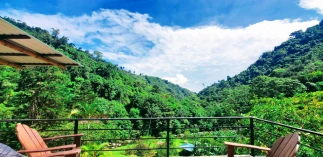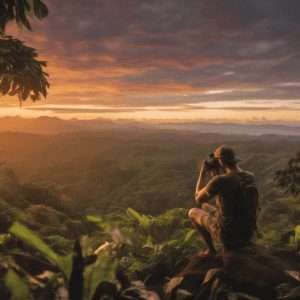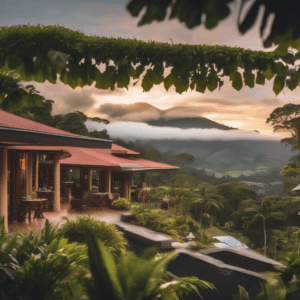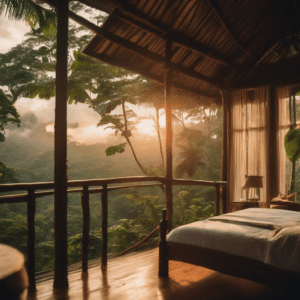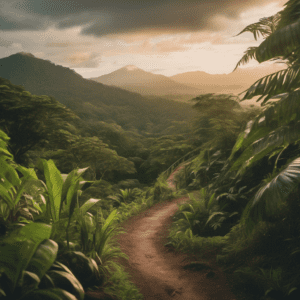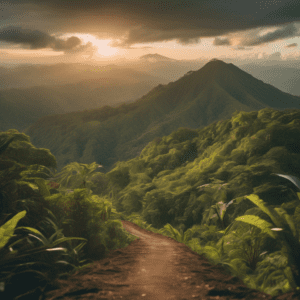The emerald hills and lush coastlines of Costa Rica have become a haven for those seeking life beyond concrete walls and constant connectivity. For many, off-grid Costa Rica living represents complete independence—a lifestyle built around self-sufficiency and solitude. For others, eco-living embodies balance—embracing sustainability while remaining part of a connected, responsible community. Though both share roots in environmental awareness, they branch in distinctly different directions.
The difference lies not only in how people power their homes but also in how they define comfort, freedom, and harmony with the natural world.
The Shared Spirit of Simplicity
Both off-grid and eco-living philosophies are rooted in the same impulse—to live lighter on the land. In Costa Rica, where nature reigns supreme, this mindset fits naturally into daily life. Rainforests, waterfalls, volcanoes, and coastlines remind residents of nature’s generosity and fragility.
The people drawn here often crave something real—fresh air instead of traffic fumes, sunrise over emails, and connection over consumption. Yet the path they choose—complete self-reliance or integrated sustainability—determines how their relationship with nature unfolds.
What Defines Off-Grid Living?
Off-grid living is a commitment to independence. It means operating without reliance on public utilities such as electricity, water, or sewage systems. Those who live off the grid in Costa Rica often generate their own power, collect rainwater, manage waste onsite, and produce much of their own food.
This lifestyle isn’t merely rustic—it’s deliberate. It requires planning, patience, and adaptability. People choose it not just to reduce their footprint but to reclaim autonomy.
Common characteristics of off-grid living include:
- Solar or micro-hydro power systems for electricity.
- Rainwater collection and filtration for daily use.
- Composting toilets or biodigesters to manage waste responsibly.
- Organic gardens or permaculture setups for food security.
- Limited reliance on digital connectivity and modern infrastructure.
Living off-grid is both a challenge and a reward—a constant dialogue with the environment. When rain is scarce, power is precious. When the garden thrives, dinner grows steps away.
What Defines Eco-Living?
Eco-living, by contrast, thrives on connection—connection to community, modern technology, and ecological design principles. Eco-living emphasizes coexistence over isolation. While sustainability remains central, comfort, efficiency, and collaboration play larger roles.
An eco-home in Costa Rica may still use solar panels and water recycling systems, but it’s often located near other homes, part of a shared community that values environmental stewardship without completely disconnecting from modern life.
Core elements of eco-living include:
- Green architecture is designed for minimal environmental impact.
- Renewable energy integration with grid backup.
- Sustainable materials like bamboo, reclaimed wood, or adobe.
- Community gardens or co-ops for shared resources.
- Smart water and waste management systems.
Eco-living seeks harmony rather than detachment—balancing sustainability with practicality.
The Landscape That Shapes Both
Costa Rica’s geography nurtures both lifestyles. The country’s diverse microclimates—from humid coasts to cool highlands—create countless possibilities for sustainable living.
In remote mountain regions, off-grid life flourishes where infrastructure rarely reaches. The silence is total, the night skies vast. Solar arrays glint under steady sun, while wood stoves glow in the cool evenings.
In contrast, eco-living often takes root near small towns or intentional communities—places like Nosara, Monteverde, or Atenas—where sustainability meets social interaction. The forest may still be close, but fiber-optic lines and local markets remain within reach.
The Philosophy Behind the Power
The most profound difference between off-grid and eco-living lies in philosophy.
Off-grid living is a statement of independence. It’s about removing dependency on centralized systems—choosing self-reliance over convenience. Power generation, water storage, and food production become personal responsibilities.
Eco-living, meanwhile, is a statement of integration. It recognizes that sustainability can thrive through cooperation—combining individual efforts with collective solutions to maintain comfort and community.
In essence, one path seeks isolation from the system; the other seeks to improve it.
Practical Considerations for Each
Both paths require intentional design, but their day-to-day realities differ sharply.
Off-Grid Living:
- Maintenance-intensive: Equipment like solar batteries, inverters, and water systems requires constant care.
- Resource awareness: Power and water usage must be balanced with supply.
- Limited convenience: Connectivity and access to modern services can be difficult.
- Freedom from fluctuation: Utility bills, outages, and city noise vanish from daily concern.
Eco-Living:
- Balanced energy: Often tied to local grids for backup power.
- Social interaction: Proximity to others fosters cooperation.
- Lower entry barrier: Easier to implement with modern support systems.
- Sustainable comfort: Eco-tech blends with daily convenience.
Both offer freedom, but they define it differently—one through isolation, the other through mindful inclusion.
The Role of Technology
Technology is where the philosophies diverge most visibly.
Off-grid systems depend on technology only to the extent necessary to sustain independence. Solar panels, satellite connections, and water purification systems are tools, not luxuries. Many off-grid residents intentionally limit gadgetry to maintain simplicity.
Eco-living, however, welcomes innovation. Smart home systems, greywater recycling, and electric mobility are embraced to enhance sustainability without sacrificing convenience. The relationship with technology is not rejection but refinement—choosing tools that support ecological goals.
Environmental Footprints
It’s tempting to assume off-grid living has a smaller footprint—but that’s not always true. Poorly managed off-grid systems can consume more resources if built inefficiently or maintained improperly. For instance, overuse of timber for heating or inadequate waste treatment can harm local ecosystems.
Eco-living communities, while more connected, often operate under strict sustainability standards. Shared infrastructure and collective efforts can significantly reduce per-person impact.
In essence, sustainability depends not just on isolation but on intention. How thoughtfully one manages energy, water, and waste determines environmental success.
The Social Dimension
Off-grid living tends to attract individualists—those seeking solitude, autonomy, or a slower rhythm. Days are spent tending gardens, maintaining systems, and aligning with nature’s pace. Community, when it exists, is often small and informal.
Eco-living attracts collaborators—those who see sustainability as a shared responsibility. These communities thrive on workshops, shared gardens, and collective problem-solving. Social connection becomes part of sustainability itself.
Neither is superior—each fulfills a different emotional need. One nourishes self-reliance; the other nurtures belonging.
The Financial Reality
Starting costs can vary widely.
Off-grid setups require upfront investment in solar systems, water infrastructure, and land improvement. While monthly expenses drop dramatically afterward, maintenance can be time-consuming.
Eco-living developments often involve shared amenities and community-managed systems, spreading costs across residents. While property prices in eco-communities may be higher, they often include services and long-term stability.
Both paths can be financially sustainable, but success relies on careful planning, not impulse.
Adapting to Climate and Terrain
Costa Rica’s climate poses unique challenges to both lifestyles. In mountainous regions, frequent rain demands advanced drainage and mold prevention. On the coast, salt and humidity corrode equipment quickly.
For off-grid living, site selection is crucial—solar exposure, access to water sources, and soil fertility determine long-term viability.
For eco-living: thoughtful architecture ensures ventilation, energy efficiency, and resilience against tropical elements. Both lifestyles thrive only when design honors the landscape, not fights it.
Food Sovereignty and Connection to the Land
Food plays a central role in both lifestyles, though in different ways.
Off-grid living often emphasizes total self-sufficiency—fruit trees, permaculture gardens, and small livestock sustain daily needs. Each meal feels earned, every harvest personal.
Eco-living communities tend to promote shared abundance—cooperative gardens, local markets, and partnerships with organic farmers. The connection to food remains strong but more communal than solitary.
Both paths encourage reconnection with natural cycles, replacing consumption with cultivation.
Challenges of Each Lifestyle
Neither lifestyle is without struggle.
Off-grid challenges:
- Isolation can feel intense, especially during storms or equipment failure.
- Maintenance demands physical labor and problem-solving.
- Access to medical and emergency services may be limited.
Eco-living challenges:
- Balancing community expectations can be complex.
- Sustainability initiatives may increase upfront costs.
- Dependence on shared systems can reduce personal control.
The key lies in awareness—choosing the form of freedom that aligns with one’s temperament and values.
The Emotional Landscape
Beyond systems and sustainability, both lifestyles shape inner life profoundly.
Off-grid residents often describe a deep sense of presence. The rhythm of weather, the hum of insects, and the cycle of sunlight dictate each day. There’s solitude but also spiritual richness.
Eco-living participants, meanwhile, speak of purpose—living among like-minded people who share a vision of balance and renewal. Connection becomes nourishment, replacing the isolation of modern urban life.
Both paths cultivate gratitude, though one grows it in silence, the other through collaboration.
The Role of Community Vision
Eco-living often emerges from a collective vision. Intentional communities design shared infrastructure, outline ecological principles, and set social norms. This cooperation builds resilience and shared accountability.
Off-grid living, conversely, thrives on personal vision. Each home, each system, each garden reflects individual philosophy. Success depends on creativity and adaptability rather than consensus.
Both embody freedom—the former through unity, the latter through solitude.
Sustainability as a Shared Language
Whether isolated in the highlands or settled near a cooperative eco-village, both lifestyles speak the same language: respect for the earth.
They challenge the modern assumption that comfort must cost the planet. Both replace consumption with creation, ownership with stewardship. The difference lies in method, not motivation.
In Costa Rica—a country already leading in renewable energy and forest conservation—these lifestyles are not radical; they’re natural extensions of the national ethos.
A Shift in Values
Choosing between off-grid and eco-living often reflects personal priorities rather than ideology. Some seek silence; others seek shared growth. Some crave mastery over their resources; others prefer synergy within a group.
What unites both is a quiet rebellion against waste and detachment. It’s not about rejecting modernity but redefining progress through mindfulness and respect.
The Sensory Experience of Each
Off-grid life feels raw—the hiss of rain on tin roofs, the hum of insects replacing distant traffic, the glow of lanterns when clouds dim the panels. The silence is total, punctuated only by the natural soundtrack of the wild.
Eco-living, though quieter than city life, still hums with gentle interaction—neighbors tending gardens, shared meals, children playing near fruit trees. There’s life, laughter, and shared energy amid sustainability.
Each offers a different kind of serenity—one solitary, the other social.
Long-Term Sustainability
Off-grid systems demand constant adaptation. Weather patterns shift, solar yields fluctuate, and maintenance is lifelong. Success depends on commitment and resilience.
Eco-living benefits from shared systems that evolve collectively—more stability, less vulnerability. Yet it may compromise the pure independence that defines off-grid life.
In the end, longevity depends on intention and flexibility. The goal is not perfection but equilibrium—a life sustained by awareness.
Choosing Between the Two
Those drawn to off-grid living often value:
- Independence and self-reliance.
- Minimal interference from systems or authorities.
- Deep solitude and quiet reflection.
- Hands-on engagement with the land.
Those leaning toward eco-living often value:
- Collaboration and community.
- Shared resources and responsibilities.
- Modern comforts balanced with sustainability.
- Collective impact and innovation.
Neither path is superior—they simply mirror different expressions of the same reverence for nature.
Conclusion
Costa Rica stands as fertile ground for both off-grid and eco-living dreams. The nation’s biodiversity, renewable energy commitment, and warm climate create endless opportunities for those seeking harmony with the earth.
The difference between these two paths is subtle yet significant: one looks inward toward self-sufficiency, the other outward toward shared sustainability. Both challenge the modern rush, replacing it with rhythms dictated by rain, soil, and sunlight.
In the end, the choice isn’t about where to live—it’s about how to live. Whether alone beneath a canopy of stars or in a mindful community where laughter mingles with birdsong, the purpose remains the same: to live with intention, grace, and respect for the land that sustains all.

